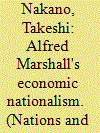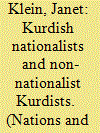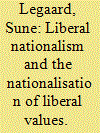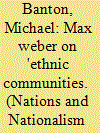|
|
|
Sort Order |
|
|
|
Items / Page
|
|
|
|
|
|
|
| Srl | Item |
| 1 |
ID:
076746


|
|
|
|
|
| Publication |
2007.
|
| Summary/Abstract |
Alfred Marshall has been seen as an economic liberal and one of the founders of the neo-classical school. However, this article challenges such conventional wisdom and argues that Marshall is best understood as an economic nationalist. Economic nationalism has been falsely associated with mercantilism, the zero-sum view of international economies, and so on. However, a new approach for studying economic nationalism has recently been proposed to redefine its conception. The present article shows that Marshall's economic thought is compatible with this new conception of economic nationalism. Marshall emphasised the role of nationality in the economic process. The characteristics of his economic thought, such as the evolutionary view of economy, conform more closely to Friedrich List's economic nationalism than to economic liberalism. By portraying Marshall's theory as that of economic nationalism, the author concludes that economic nationalism can have a systematic theory.
|
|
|
|
|
|
|
|
|
|
|
|
|
|
|
|
| 2 |
ID:
076749


|
|
|
|
|
| Publication |
2007.
|
| Summary/Abstract |
Recent scholarship has begun to nuance the idea of Ottoman decline, but few works have attempted to see nationalism outside of the dominant decline paradigm. By addressing the emergence of Kurdish nationalism in the late Ottoman period, this paper questions the idea that imperial disintegration and nationalism were inherently intertwined; and challenges not only the mutually causal relationship that has been emphasised in literature to date, but also the shape that the 'nationalist movement' took. Using archival sources, the Kurdish-Ottoman press, travel literature and secondary sources in various languages, the present paper will illustrate how the so-called Kurdish nationalist movement' was actually several different movements, each with a differing vision of the political entity its participants hoped to create or protect through their activities. The idea of Kurdish nationalism, or Kurdism, may have been present in the minds of these activists, but the notion of what it meant was by no means uniform. Different groups imbued the concept with their own meanings and agendas. This study demonstrates that most 'nationalists' among the Kurds continued to envision themselves as members of the multi-national Ottoman state, the temptingly powerful rise of nationalism in their day notwithstanding. The suggestion has important implications for students and scholars of nationalist movements among other non-dominant groups, not only in the Ottoman Empire but in contemporaneous empires such as the Habsburg, and in later states like Iraq, Rwanda and Sudan. The present study further questions the received wisdom that multi-ethnic entities are a recipe for disaster. It proposes that a joint effort to rethink what we know about minority nationalism may involve not only a reconceptualisation of the very terms we use, but perhaps an accompanying shift in approach too.
|
|
|
|
|
|
|
|
|
|
|
|
|
|
|
|
| 3 |
ID:
076745


|
|
|
|
|
| Publication |
2007.
|
| Summary/Abstract |
This article considers whether appeals to 'national values' in public discourse and political debate might be a form of nationalism. This theoretical question about the applicability of the category of nationalism faces the objections that political values cannot constitute nationality, and that this is even more so the case when the values in question are liberal, as they often are. Against these objections, it is argued that 'the nationalisation of liberal values' may, and in some contexts of immigration and Europeanisation probably do, exhibit 'boundary mechanisms' that are among the central features of nationalism. This feature of the nationalisation of liberal values carries both normative and explanatory implications, which relate to the concerns of 'liberal nationalism'.
|
|
|
|
|
|
|
|
|
|
|
|
|
|
|
|
| 4 |
ID:
076744


|
|
|
|
|
| Publication |
2007.
|
| Summary/Abstract |
An untitled draft found among Weber's posthumous papers was published. In English translation it was given the title `Ethnic Groups'. In the Max Weber Gesamtausgabe it is titled `Ethnic Communities'. In this manuscript, Weber treated the feeling of belonging together because of shared ethnic origin as a social construct, underlain by a desire to monopolise power and status. Subsequently, Weber determined to put an end to the use of collectivist concepts, but at the time of writing he treated groups as real entities, instead of using the concept of group as an aid in the explanation of behaviour. The causal connections in ethnic group formation and maintenance have been more closely identified in subsequent sociological analysis.
|
|
|
|
|
|
|
|
|
|
|
|
|
|
|
|
| 5 |
ID:
076743


|
|
|
|
|
| Publication |
2007.
|
| Summary/Abstract |
The territorial integrity of nations is often taken as the premise for a functioning, unifying national identity. Yet, the economic and technological developments of recent decades have made it necessary to question this assumption. It can no longer be taken for granted that the people who identify with a given nation inhabit the same space, nor can it be assumed that cultural homogenisation takes place at the level of the nation through mass media. When the Internet appeared, many social scientists and commentators predicted that it would threaten the cultural integrity of nations; that the non-territorial character of the Internet would lead to fragmentation and unprecedented cultural differentiation, making it difficult, eventually impossible, to uphold a collective sense of national identity based on shared images, representations, myths and so on. Although it is too early to draw any conclusions regarding the long-term effects of the Internet, experiences so far suggest that such predictions were mistaken. In fact, nations thrive in cyberspace, and the Internet has in the space of only a few years become a key technology for keeping nations (and other abstract communities) together. Nations which have lost their territory (such as Afrikaner-led South Africa), nations which are for political reasons dispersed (such as Tamil Sri Lanka or Kurdistan), nations with large temporary overseas diasporas (such as Scandinavian countries, with their large communities in Spain during winter), or nations where many citizens work abroad temporarily or permanently (such as India or Caribbean island-states), appear in many sites on the Internet - from online newspapers and magazines to semi-official information sites and 'virtual community' homepages. In a 'global era' of movement and deterritorialisation, the Internet is used to strengthen, rather than weaken, national identities.
|
|
|
|
|
|
|
|
|
|
|
|
|
|
|
|
| 6 |
ID:
076748


|
|
|
|
|
| Publication |
2007.
|
| Summary/Abstract |
The concept of the Other is increasingly popular in nationalism and ethnicity literature, which usually proposes the existence of one significant Other for any national Self, and that this Other is usually threatening and negative. This approach is one-sided and in need of revision. I suggest that any nation may have many simultaneously existing Others, and more importantly, these Others need not be negative - they may also be positive. By exploring how (1) 'the Other' matters in identity construction; (2) there can be several Others at any one time; (3) the Other can be positive as well as negative; (4) the role of any given Other can change during various phases of national identity construction and maintenance; and (5) the particular 'otherness' of the Other has social and political consequences, this article will reconsider the role of otherness in the construction, transformation and maintenance of Estonian national identity
|
|
|
|
|
|
|
|
|
|
|
|
|
|
|
|
|
|
|
|
|